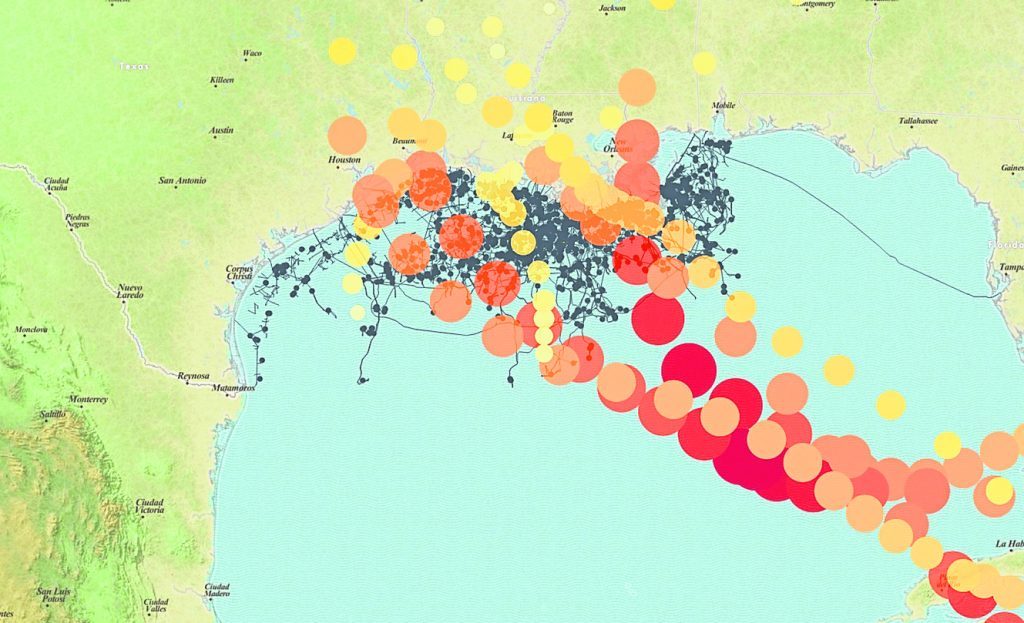
Digitisation – def. The process of changing from analog to digital form.
Digitalisation – def. The use of digital technologies to change a business model and provide new revenue and value producing opportunities.
With the effect of this year’s hurricane season still being felt throughout the US, its impact on critical oil and gas infrastructure was immediate; catastrophic in some circumstances, and it will undoubtedly be costly to repair. While we can’t predict when and where hurricanes will strike long term, nor can we forecast wind and wave ferocity, we could however combine lots of information from a wide variety of sources and then incorporate it into a digitalisation programme to better plan for these extreme yet periodic weather events and offer our energy asset infrastructure greater protection.
As the operational performance and reliability of production assets can reduce over time as assets age, often significantly beyond their original design life, the physical impact on infrastructure caused not only by daily weathering but most notably by heightened natural disasters, can have a material impact on the viability of the infrastructure. However, by digitising collated historic records, then combining the often-disparate digital datasets with weather records, Calash are be able to run more accurate simulation modelling, having an effect on, at the very least, inspection, repair and maintenance workload, insurance premiums, life of field management, and HSE management.
For example, the digitalisation of shallow water subsea pipelines in the Gulf of Mexico where we combine information on pipelines and their operational characteristics with other data provided by our clients own in house data sets, public data such as nearby vessel activity by type (for example, fishing vessels dragging anchors), soil conditions, seabed topography and wave action on the seabed, would begin to identify pipelines that may be susceptible to integrity damage. The same approach could be adopted for all other assets using appropriate measurements. Rarely is this interpretation of combined data carried out unfortunately, resulting in higher costs associated with major repairs or replacement.
In our often complex oil and gas supply chain, operators and service companies alike collect key pieces of the data puzzle individually, and for fear of competition or unless of direct benefit to them or remunerated somehow, are reluctant to share this information. In our experience they often don’t recognise the value of the information they have within their organisation and how it could help others and also, help themselves.
Having reviewed a large number of companies, Calash is often requested to provide help to maximise our client’s commercial opportunities. In order to achieve this, one of the best enablers is sourcing information often regularly found within the companies themselves. Digitalising the information allows it to interact with other disparate information sources, and the collation and sharing of this new unique data within the organisation often leads to significant commercial gain.
Equally, if companies holding historic and current data on an asset were to digitise it – allowing it to be collated and interpreted against others – then the value of each piece of data will undoubtedly rise. By having an open book approach to data, even if not all parties see an immediate benefit, then the industry at large most certainly would. For example, readily accessible, digitalised data could improve benchmarking, data interpretation effectiveness, component standardisation, procurement efficiency, inventory stock levels, staff shortages, training standards, barriers to entry and so on.
Management and interpretation of big data is already here and delivering value across our industry, but there is a lot more we can do throughout the supply chain, so next time you come across some interesting information, consider if there is value in digitising it, making it accessible first throughout your own organisation, and then with your supply chain. If you’re not sure if there is any value in what you have or what to do with it, ask us. It will more likely than not lead to positive change and will ultimately help not only your own organisation, but our industry overall.
Calash is an energy and natural resources commercial and strategic specialist consultancy, with offices in Houston, Aberdeen, New York, London, and Sydney.
Recommended for you
